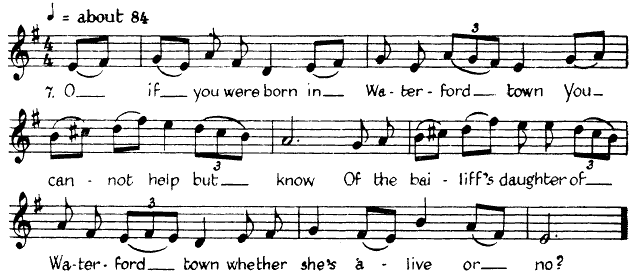Bailiff's Daughter- Young (NS) 1933 Senior/Creighton; Version C
THE BAILIFF'S DAUGHTER OF WATERFORD (Second variant) (See Roast's 1937 version with more complete lyrics)
Noted from the singing of Thomas Young, of West Petpeswick, N.S., by Doreen H. Senior and Helen Creighton, September 7th, 1933.

(This is verse 6; it's verse 7 of the Roast version)
7. "O if you were born in Waterford town,
You cannot help but know,
Of the bailiff's daughter of Waterford town
Whether she's alive or no?"
---------------
1. It's of a youth and a well-bred youth
It was a squire's son,
He fell in love with a bailiff's daughter
That lived near Waterford town.
2. O when his parents came to know
That he was so foolish inclined,
They bound him a prentice fin Camertown
And they told him his business to mind.
3. For to mind his books and to study them,
And to leave his true love behind,
"Alas in this world may I never see you more,
But she's still run in my mind."
4. O it happened to be in the summer time
When all things were blooming and gay,
She sat herself down on a bank that was green
And her true love came riding that way.
5. "O where was you bred? O where was you born?"
The squire to her did say,
"In Waterford town, I was born, kind sir,
Where I've suffered a many's the day".
6. "O if you were born in Waterford town,
You cannot help but know,
Of the bailiff's daughter of Waterford town
Whether she's alive or no?"
7. "She is not alive, for she is dead
A many a long month ago,
She is not alive, for she is dead,
And in her grave I know."
8. "O come saddle me a milk-white steed,
"O come saddle me for me,"
"O come saddle me a milk-white steed,
That I never expected for to see."
[Note. The words of the two versions differ very little (See Roast's 1937 version with more complete lyrics), but Thomas Young's wants Verse 5, and except under the second variant tune Walter Roast's words have beenp rinted. Both versions include the Verse 3 alluded to in the notes. Ed.]
I have noted a Mixolydian variant of Walter Roast's tune to 'I prithee send my littel foot-boy,' or 'Mother, mother, make my bed' (see Journal No. 19, pp. 135-6, where Miss Broadwood adds a note that the tune is like one type of the 'Died for Love'
air) and I have also found versions of the tune published by Chappell, (see Popular Music of the Olden Time, Vol. I, pp. 203-4) who first, I believe, introduced 'The Bailiff's Daughter to the English public) in Westmorland and Yorkshire as a hornpipe called 'Iron Legs'. I have not seen verse 3 of the above version before. A. G. G.
Thomas Young's tune is pasticularly interesting. There is a vague resemblance of melodic line, though in a different mode, to the tune in Broadwood-Birch Reynardson's Sussex Songs, N o. 5. Verse 3 of the above text is new to me. F. M. C.
Good Dorian tunes.-A. M. F.
Both good tunes, especially Thomas Young's with its fines weep. The text also has interesting points. C. C.
2 Chappell published two tunes, and he describes the one resembling Walter Roast's as "the traditional tune to which it is commonly sung throughout the country." But in Journal 27, pp. 336 both Lucy Broadwood and Frank Kidson report that they have heard, from different sources, that this 'traditional' tune had been composed by Dr. Rimbault. See also Journal 3, p. 125 and Journal 4, p. 209, where the tune of 'The Bailiff's Daughter' is equated with ' The Seeds of Love'. Ed.